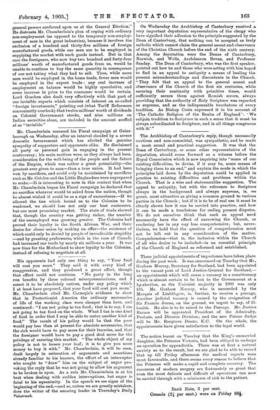His opponents bad only one thing to say, " Your
food will cost you more." They said it with every kind of exaggeration, and they produced a great effect, though that effect could not continue. " No party in the long run benefits by these colossal misrepresentations, and I assert it to be absolutely untrue, under any policy which I at least have proposed, that your food will cost you more." Mr. Chamberlain cited Mr. Carnegie's evidence to show that in Protectionist America the ordinary necessaries of life of the working class were cheaper than here, and continued : "I am not going to tax food ; that is to say, I am not going to tax food on the whole. What I tax is one kind of food in order that I may be able to untax another kind of food." The result of his policy would be that the poor would pay less than at present for absolute necessaries, that the rich would have to pay more for their luxuries, and that the foreigner would have to pay a good deal more for the privilege of entering this market. " The whole object of my policy is not to lessen your loaf; it is to give you more money to buy it with." Mr. Chamberlain, it will be seen, dealt largely in reiteration of arguments and assertions already familiar to his hearers, the effort of an interrupter who sought to "draw" him on the subject of sugar pro- voking the reply that he was not going to allow his argument to be broken in upon. As a rule Mr. Chamberlain is at his best when dealing with sudden interruptions, but sugar is fatal to his equanimity. In the speech we see signs of the beginning of the end,—and so, unless we are greatly mistaken, does the writer of the amazing leader in Thursday's Daily Talsoravh.










































 Previous page
Previous page